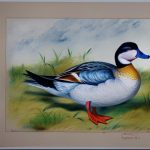Ducks are not only known for their adorable appearance and amusing quacks, but they are also excellent egg layers. Duck eggs are larger and have a richer flavor compared to chicken eggs, making them a popular choice for baking and cooking. When it comes to egg production, not all duck breeds are created equal. Some breeds are known for their prolific egg-laying capabilities, while others are better suited for meat production or ornamental purposes. In this article, we will explore the different duck breeds that are ideal for egg production, their characteristics, and factors to consider when choosing the right breed for your needs. We will also discuss the care and maintenance of duck breeds for egg production and how to maximize egg production from different duck breeds.
Table of Contents
- 1 Popular Duck Breeds for Egg Laying
- 2 Characteristics of Different Duck Breeds for Egg Production
- 3 Factors to Consider When Choosing a Duck Breed for Egg Production
- 4 Care and Maintenance of Duck Breeds for Egg Production
- 5 Maximizing Egg Production from Different Duck Breeds
- 6 Conclusion and Final Tips for Choosing the Right Duck Breed for Egg Production
- 7 FAQs
- 7.1 What are the best breeds of ducks for egg production?
- 7.2 How many eggs can a duck lay in a year?
- 7.3 What are the characteristics of a good egg-laying duck breed?
- 7.4 Do duck eggs taste different from chicken eggs?
- 7.5 What is the average size of duck eggs?
- 7.6 How long does it take for a duck to start laying eggs?
Key Takeaways
- Duck breeds for egg production vary in size, color, and egg-laying capabilities.
- Popular duck breeds for egg laying include the Khaki Campbell, Indian Runner, and White Crested.
- Different duck breeds have unique characteristics such as egg color, size, and temperament.
- Factors to consider when choosing a duck breed for egg production include climate, space, and egg production rate.
- Care and maintenance of duck breeds for egg production involve providing proper housing, nutrition, and healthcare.
Popular Duck Breeds for Egg Laying
1. Khaki Campbell: The Khaki Campbell is a popular duck breed known for its exceptional egg-laying abilities. These ducks are capable of laying up to 300 eggs per year, making them one of the most prolific egg layers among duck breeds. They are also known for their calm and friendly demeanor, making them a great choice for backyard enthusiasts.
2. Indian Runner: Indian Runner ducks are another popular choice for egg production. These ducks are known for their upright stance and distinctive walking style. They are capable of laying around 200-300 eggs per year, making them a reliable source of fresh eggs for your household. Indian Runners come in a variety of colors, adding a touch of diversity to your flock.
Characteristics of Different Duck Breeds for Egg Production
1. Khaki Campbell: The Khaki Campbell is a medium-sized duck with a khaki-colored plumage. They are known for their excellent egg-laying capabilities and can produce large, white eggs consistently throughout the year. Khaki Campbells are also known for their calm and sociable nature, making them easy to handle and suitable for backyard settings.
2. Indian Runner: Indian Runner ducks are slender and upright in appearance, with a distinctive walking style that sets them apart from other duck breeds. They come in a variety of colors, including fawn, white, black, and chocolate. Indian Runners are known for their high egg production and can lay eggs in a wide range of colors, including white, blue, green, and even olive.
Factors to Consider When Choosing a Duck Breed for Egg Production
When choosing a duck breed for egg production, there are several factors to consider to ensure that you select the right breed for your specific needs. Some of the key factors to consider include the climate in your area, available space for housing and ranging, and your personal preferences in terms of egg color and size. It’s also important to consider the temperament of the duck breed, especially if you have children or other pets in your household. Additionally, you should consider the availability of the breed in your area and whether they are suitable for free-ranging or confinement.
Another important factor to consider is the purpose of egg production. If you are looking to sell duck eggs commercially, you may want to choose a breed that is known for its high egg production and marketable egg size. On the other hand, if you are primarily interested in producing eggs for personal consumption, you may prioritize factors such as flavor and yolk color over sheer quantity. It’s also important to consider the availability of resources such as feed and water in your area, as some duck breeds may have specific dietary requirements or be more sensitive to environmental conditions.
Care and Maintenance of Duck Breeds for Egg Production
Proper care and maintenance are essential for ensuring the health and well-being of duck breeds used for egg production. Providing a suitable housing environment that offers protection from predators and the elements is crucial for keeping ducks safe and comfortable. Ducks also require access to clean water for drinking and bathing, as well as a balanced diet that meets their nutritional needs for optimal egg production.
Regular health checks and preventive measures such as vaccinations and parasite control are important for maintaining the overall health of your duck flock. It’s also essential to provide adequate space for ducks to roam and exercise, whether through free-ranging or providing a spacious enclosure for them to move around. Additionally, maintaining good hygiene in the duck housing area and regularly cleaning nesting boxes can help prevent the spread of diseases and ensure the quality of the eggs produced.
Maximizing Egg Production from Different Duck Breeds

To maximize egg production from different duck breeds, it’s important to provide a conducive environment that meets their specific needs. This includes ensuring that ducks have access to a balanced diet that provides essential nutrients for egg production, such as calcium for strong eggshells and protein for overall health and reproductive performance. Providing nesting boxes with comfortable bedding can encourage ducks to lay eggs in a designated area, making it easier to collect and monitor egg production.
Managing stress factors such as overcrowding, excessive noise, or predator threats can also help maximize egg production by reducing potential disruptions to the ducks’ natural laying behavior. Additionally, providing ample access to clean water for drinking and bathing can help keep ducks healthy and encourage consistent egg production. Regular monitoring of egg production and health status can help identify any issues early on and allow for prompt intervention to maintain optimal egg production levels.
Conclusion and Final Tips for Choosing the Right Duck Breed for Egg Production
In conclusion, choosing the right duck breed for egg production involves considering various factors such as climate, space availability, temperament, purpose of egg production, and resource availability. Popular duck breeds known for their prolific egg-laying capabilities include Khaki Campbells and Indian Runners, each with its own unique characteristics and advantages. Proper care and maintenance are essential for ensuring the health and well-being of duck breeds used for egg production, including providing suitable housing, access to clean water, a balanced diet, and regular health checks.
To maximize egg production from different duck breeds, it’s important to provide a conducive environment that meets their specific needs, including providing a balanced diet, comfortable nesting areas, managing stress factors, and regular monitoring of egg production and health status. By considering these factors and implementing proper care practices, you can ensure a consistent supply of fresh eggs from your chosen duck breed while promoting the overall health and well-being of your duck flock.
If you’re interested in learning more about breeds of ducks for eggs, you might also want to check out this informative article on when duck mating season occurs. Understanding the mating season can be crucial for those looking to breed ducks for eggs, as it can impact egg production and overall flock management.
FAQs
What are the best breeds of ducks for egg production?
Some of the best breeds of ducks for egg production include the Khaki Campbell, Indian Runner, and the Welsh Harlequin. These breeds are known for their high egg production and are popular choices for small-scale egg farming.
How many eggs can a duck lay in a year?
On average, a duck can lay between 150-300 eggs per year, depending on the breed and individual bird. Some high-producing breeds can lay even more eggs in a year.
What are the characteristics of a good egg-laying duck breed?
Good egg-laying duck breeds are known for their high egg production, good egg size, and consistent laying throughout the year. They should also be hardy and adaptable to different climates and management systems.
Do duck eggs taste different from chicken eggs?
Duck eggs have a richer flavor and a larger yolk compared to chicken eggs. Some people also find duck eggs to be creamier and have a slightly higher fat content.
What is the average size of duck eggs?
Duck eggs are typically larger than chicken eggs, with an average size of about 2.5 to 3.5 ounces. The size can vary depending on the breed of duck.
How long does it take for a duck to start laying eggs?
Most duck breeds start laying eggs at around 5-7 months of age, although this can vary depending on the individual bird and environmental factors.
Meet Walter, the feathered-friend fanatic of Florida! Nestled in the sunshine state, Walter struts through life with his feathered companions, clucking his way to happiness. With a coop that’s fancier than a five-star hotel, he’s the Don Juan of the chicken world. When he’s not teaching his hens to do the cha-cha, you’ll find him in a heated debate with his prized rooster, Sir Clucks-a-Lot. Walter’s poultry passion is no yolk; he’s the sunny-side-up guy you never knew you needed in your flock of friends!







